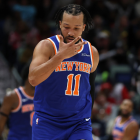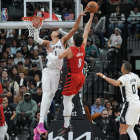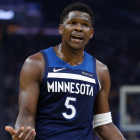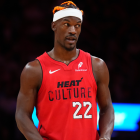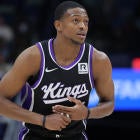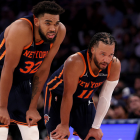MINNEAPOLIS -- With five minutes left in Game 3 and the home team up nearly 20 points on the NBA's best regular season team, Minnesota Timberwolves fans were suddenly brimming with confidence.
"WOLVES IN SIX! WOLVES IN SIX!" they chanted.
Spring was in the air in Minnesota. The 20 inches of snow from a week before was melting in the 60-degree gift of a spring day. Joggers lapped lakes, restaurant patios opened up, and radio stations played on loop the joyful music of this city's hometown hero to mark two years since Prince's death. Hope, as they say, was springing eternal.
So you can forgive the confidence -- or the hubris, or perhaps the sheer irrationality -- of Timberwolves fans to think that one top-notch performance from their Wolves would set this team on the path to the second round. Minneapolis was, after all, hosting its first playoff game in 14 years, ending the second-longest playoff drought in NBA history. The game tipped off with the electrifying guitar riff at the beginning of Prince's "When Doves Cry," and was followed by what was by far the Timberwolves' most intense 48 minutes of these playoffs.
The Wolves bottled up NBA scoring champ James Harden; yes, he scored a game-high 29 points, but it was not a particularly efficient 29 points, and Harden did not by any measure take over this game.
"As a team we're just trying to slow him down, throw bodies at him," Andrew Wiggins said afterward.
Karl-Anthony Towns continued his playoff-long disappearing act in the first half, but then finally awoke in the second half, finishing with 18 points and more importantly 16 rebounds, finally getting the better of Rockets center Clint Capela.
Minnesota spread the wealth on offense. Five players scored 17 or more points, led by Jimmy Butler's 28. It was Butler's first decent game of these playoffs; in Game 1 he scored 13 points and in Game 2 he scored 11 points on only 6 shots.
"For the last couple days I got tired of my teammates telling me to be more aggressive, so I took it on myself to do just that," Butler said afterward.
Derrick Rose continued to remind us why he was once a league MVP as he scored 17 points in 21 minutes. Jeff Teague and Wiggins, with 23 and 20 points respectively, each played smart, efficient games. Taj Gibson did all the little things that don't show up in a box score, including one possession in which he shut down Harden in one-on-one defense and forced him into an airball.
Most importantly, the Timberwolves beat the Rockets at their own game. Minnesota got hot from deep, making 15 of its 27 3-point attempts (55.6 percent). But 3s weren't quite falling for the Rockets; Houston made 15 out of 41 3-point attempts (36.6 percent). The Rockets were helping non-stop on defense, and Minnesota was patient and smart enough to find the open man and make the open shots.
"We made shots, which is a big part of it," Timberwolves coach Tom Thibodeau said afterward.
Rockets coach Mike D'Antoni went a step further with his assessment.
"They hit better shots," D'Antoni shrugged afterward.
And there's the rub.
During the season, no team shot more 3-pointers than the Rockets did. Houston averaged more than 42 3-point attempts per game, an NBA record. That led to an offense that was the best in the league, and one of the best in NBA history.
And no team shot fewer 3-pointers than the Timberwolves, averaging 22.5 attempts per game. The Rockets' historically good offense exemplifies new-school basketball, while the Timberwolves offense is a bit of a dinosaur -- a very talented, very efficient dinosaur, one that still had the NBA's fourth-most efficient offense -- but a dinosaur nonetheless.
Houston hasn't played a single great game this series and yet still leads 2-1. Even in the Game 2 blowout, the Rockets only shot 30.8 percent from 3 (in Game 1 they were even worse, shooting 27 percent). The difference is when you shoot 3s at such a high volume, you can make up points in a hurry. The Rockets shot 37 3s in Game 1 and a mind-boggling 52 3s in Game 2. And a Timberwolves team that's relying on making 3s, something that might be this team's biggest weakness, is not a sustainable strategy to pull off one of the biggest first-round upsets in NBA history.
"Down the stretch we learned a lot," Thibodeau said. "Those were hard-fought games, like playoff games, and we learned from that. We still have a long way to go defensively, but we're starting to see the growth. That's critical. This is as good of an offensive team as you're going to see in this league. It requires everyone to be tied together. You have to be disciplined. You have to play with great intensity. And we're starting to do that."
The Timberwolves defense, which ranked 25th in the NBA during the regular season, was pretty darn good on Saturday night, as it has been all series. This gave the team and its fans the confidence to chant again, as the clock wound down to the buzzer, "WOLVES IN SIX! WOLVES IN SIX!" Afterward, a Prince song again came on the loudspeakers: "I was dreaming when I wrote this, forgive me if it goes astray," the Purple One sang.
But at some point, the dream always ends. And you have to assume that the dream of holding this historically good Houston offense in check -- which the Timberwolves have largely done this series, despite the Wolves' defensive struggles during the regular season -- will soon end, too.
"This city deserves to be in the playoffs a little bit longer," Butler said afterwards.
And this city will be in the playoffs a little bit longer. The emphasis, however, should be on "a little bit."










